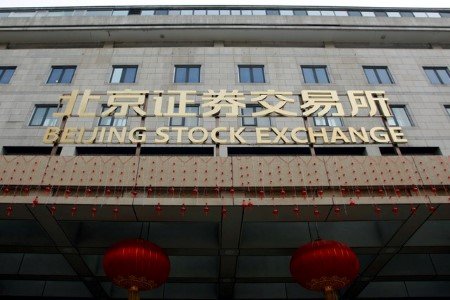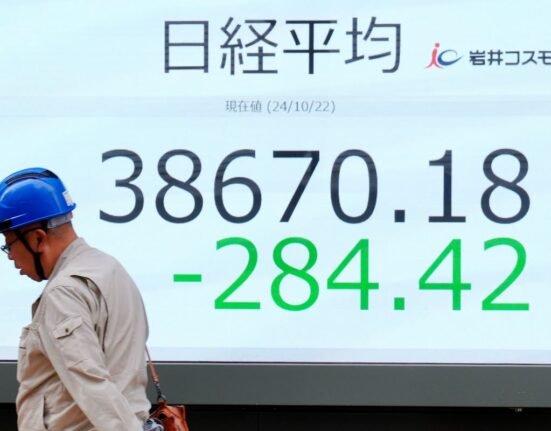The author is a Reuters Breakingviews columnist. The opinions expressed are her own.
By Una Galani
MUMBAI, Oct 21 (Reuters Breakingviews) –Xi Jinping wants a strong stock market and is doubling down on his efforts to build one. Whether the Chinese leader is a true convert to the religion of shareholder value, or simply wants to boost some $11 trillion of equities to stimulate the world’s second-largest economy, will determine his success.
Xi in April revealed his goal for a “high quality market” that “matches that of a financial power” in a policy paper on capital markets. The Chinese State Council’s “Nine Measures” aim to encourage listed companies to increase dividends and to “enhance their investment value” including through greater supervision of payouts.
It seems fanciful at first glance. Though China’s stock market has grown into the world’s second-largest, policymakers appeared unconcerned whether equities kept pace with China’s rapid growth. Since former leader Deng Xiaoping began reforms in 1978, the economy has grown an annual average rate of over 9%. But the annualised return from the MSCI China A Onshore Index amounts to 4.40%, according to Value Partners, a Hong Kong-based asset management company.
Xi appears to be jumping onto the shareholder value bandwagon as similar initiatives gain traction in Japan and South Korea. Yet stimulus initiatives announced in September nonetheless suggest Beijing is determined to pump up stocks, at least in the short term. Alongside a swap facility to allow insurers and assets managers to buy shares, the People’s Bank of China is offering companies loans via commercial banks at an interest rate of just 2.25% to finance share buybacks. The promised 800 billion yuan ($112 billion) across the two schemes is roughly equivalent to 3% of the free-float market capitalisation of stock traded on the mainland, Morgan Stanley calculates. The benchmark CSI 300 Index of onshore Chinese stocks rallied on Friday following the launch of the lending facility and is up more than 20% in a month.
At first glance, Beijing appears to be stoking another speculative bubble of the kind that has repeatedly gripped China’s stock market. Yet the central bank’s cheap funding gives companies a strong incentive to return capital to shareholders. It’s also a carrot to balance out the sticks in the new policy: Profitable firms that do not boost returns could be subject to censure.
A durably stronger stock market would help Xi stabilise the world’s second-largest economy in several ways. For starters, it could ease the desperate Chinese hunt for reliable places to park their savings. Households are wary of volatile equities and keep just 10% of their assets in stocks and mutual funds; by comparison, property comprises nearly 60%, according to Allianz Global Investors.
A collapse in real estate prices and a crackdown on wealth management products has left a giant ball of money searching for alternatives. That has fuelled hot demand for government bonds: yields on 10-year Chinese government debt have plunged to barely 2%, a level unseen since official records began. Stocks look attractive by comparison: the $120 billion oil company CNOOC and $80 billion Midea, an electrical appliance maker, boast dividend yields twice that, and analysts forecast their dividends per share will rise next year, LSEG data shows.
Stronger shareholder returns would also benefit their state owners, including local governments, whose revenue from selling land is under pressure from the turmoil in the property market. Kinger Lau, a strategist at Goldman Sachs, notes that state-owned entities (SOEs) account for 48% of the market value of Chinese equities. Every 10-percentage point rise in SOE dividend payout ratios would channel an additional 230 billion yuan ($32 billion) of cash to the government. That’s equivalent to 1% of China’s total on-budget fiscal revenue and 4% of nationwide land sales in 2023.
The companies are in good position to pay up. Chinese firms generated all-time high free cash flows last year, helped by falling capital expenditure, and are sitting on cash balances of 18 trillion yuan ($2.53 trillion) or 23% of the total value of the market, Goldman Sachs research shows.
A more reliable stock market could also support innovation. Xi has been fretting about the dwindling flock of Chinese unicorns – privately held startups with a valuation of one billion dollars or more. Stronger equity values would give founders and their backers a place to exit investments without depending on overseas exchanges in New York and London, where politicians are increasingly distrustful of Chinese businesses.
On paper, China has many more direct levers to pull than other governments when it comes to agitating for companies to improve their performance. High levels of state ownership ought to reduce the need for the sorts of detailed governance codes adopted in Japan.
Nonetheless, China’s biggest hurdle to building a strong stock market will be itself. The China Securities Regulatory Commission has regularly fallen into three traps, James Fok, explains in his book “Financial Cold War: A View of Sino-US Relations From the Financial Markets”. These include abuse of the regulator’s power, succumbing to political interference, and intervening to bail out investors when the market falls.
Political interference breeds sharp boom-and-bust cycles. A massive surge in 2015 ended in a rout which saw Shanghai-listed stocks lose about one third of their value in a single month following the CSRC’s crackdown on shadow-financed margin accounts. These wild swings keep domestic financial institutional investors at bay; they own just 11% of the mainland’s retail-driven market.
So while Xi’s ambition to build an efficient market appears well-coordinated with some other policy shifts, the objective will compete with his other priorities.
The Chinese leader also desires “new quality productive forces” to spur the economy, for example. This implies Beijing will dictate what companies build, how much they spend, a continued excess of manufacturing capacity, and who gets to the front of the queue to tap capital through an initial public offering. That level of control means the interests of corporate managers will diverge from those of their non-state shareholders.
For now, China’s equities are cheap and everyone wants higher returns. Building a strong stock market will ultimately require a hands-off approach and a fundamental change in the way the People’s Republic is governed.
Follow @ugalani on X
Editing by Peter Thal Larsen and Streisand Neto







